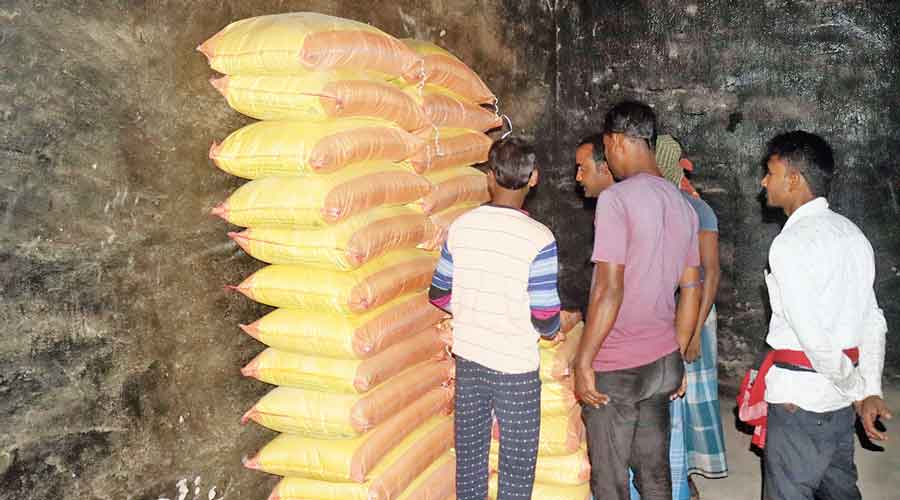Around 15 lakh potato farmers in Bengal, facing a severe fertiliser crisis in the sowing season, are compelled to buy it at higher prices from the open market because of shortage in supply through government channels fed by the Centre.
Sources said hundreds of farmers are visiting agriculture offices across the state to register complaints on the fertiliser shortage, particularly in Hooghly, East Burdwan, West Midnapore and Bankura districts.
Farmers are also complaining about retailers making the most of the crisis and charging Rs 800-1,000 over and above the retail price for a quintal of a fertiliser.
“The state government has already written to the Centre informing it about the requirement of fertilisers but there is huge shortage of MoP (muriate of potash) and DAP (diammonium phosphate). After the shortfall was reported, the Centre promised us to provide sufficient DAP in December but only one-third of the MoP required in Bengal. These fertilisers are crucial in this peak season of sowing potatoes,” said Pradip Majumdar, agriculture adviser to chief minister Mamata Banerjee.
Sources said there was around 10-20 per cent deficit in the supply of DAP and 40 per cent deficit in the supply of MoP in Bengal in November.
According to the latest communication from Delhi, it promised to provide 33,000 tonnes of DAP in December to meet the demand. However, the Centre said it would supply only 8,500 tonnes of MoP against the demand of 30,000 tonnes.
Potato, sown in November and December and harvested from March, is considered as one of the economically viable crops. According to farmers, while they earn Rs 10,000 by cultivating paddy on an acre of land, the return from potato from the same plot can be around Rs 50,000.
Bengal produces around 90-100 lakh tonnes of potatoes every year. However, last year production was higher. Bengal produced around 115 lakh tonnes of potatoes.
Agriculture department officials said earnings from potato helped many farmers run their families.
The central government supplies subsidised fertilisers to thousands of retailers through private agencies to reach farmers across India.
Senior agriculture officials in the state said the fertiliser shortage was nationwide as the Centre had imported fertilisers fewer than requirement following a sharp spike in prices in the international market.
States like Uttar Pradesh, Punjab and Haryana have the highest demand for fertilisers in this winter sowing season.
Amal Haldar, the state secretary of the CPM-affiliated All India Kisan Sabha, however, accused the Centre of supplying more fertilisers to Uttar Pradesh where elections are due next year.
“The central government has taken a policy to deprive Bengal. It is supplying extra fertilisers to Uttar Pradesh where election is due. As a result, farmers in Bengal are forced to buy fertilisers at higher prices,” said Haldar.
Sources said as soon as retailers sensed shortage in supply, they hiked up the selling price of fertilisers. Many retailers with old stocks of fertilisers sold them in the black market. “The state government should form a task force to stop black-marketing of fertilisers,” Haldar said.
Anup Chowdhury, a potato farmer from Bankura’s Katulpur who grows the crop on three acres, said he had to pay Rs 20,000 extra to buy DAP and MoP from the open market.
Farmers of Katulpur of Bishnupur in Bankura and Goghat of Hooghly had been staging demonstrations in front of retail shops and have submitted memorandums to agriculture offices accusing retailers of selling fertilisers in the black market.
“Fertilisers like DAP is usually sold at Rs 1,200 per bag (50 kg) but we are now forced to buy it for Rs 1,700. We don’t have any option as this sowing season and we cannot do without the fertiliser. We have filed complaints with the agriculture office in our area,” said Chowdhury.
The state government had already asked its officials to conduct raids on fertiliser shops in potato producing Hooghly, Bankura and East Burdwan to crack the whip on those fertiolisers at higher prices.
“Raids are on in all districts to stop black marketing. We are trying to supply liquid potash to farmers as a substitute of MoP,” said a senior agriculture official.











